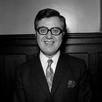Jesse Dickson Mabon 1925 – 2008
April 12, 2009
 Jesse Dickson
“Dick” Mabon
PC
FRSA
1925 – 2008 was a Scottish politician, physician and company director.
He was a Labour Co-operative MP until October 1981, when he joined the
Social Democratic Party. He left Parliament in 1983, and rejoined the
Labour Party in 1991.
Jesse Dickson
“Dick” Mabon
PC
FRSA
1925 – 2008 was a Scottish politician, physician and company director.
He was a Labour Co-operative MP until October 1981, when he joined the
Social Democratic Party. He left Parliament in 1983, and rejoined the
Labour Party in 1991.
Whilst working at the Manor House Hospital from 1958-64, Dickson Mabon would have been a colleague of Ernest Bevin, Andrew Tocher Cunningham, William Burnett Douglas Miller, and Dudley d’Auvergne Wright, and he would subsequently have known many of the great names in homeopathy, including Llewelyn Ralph Twentyman, Anthony Campbell, Michael Jenkins and the staff at the Royal London Homeopathic Hospital.
’… In Britain, Dickson Mabon performed useful work that helped sustain a major center of complementary and alternative medicine (CAM) in London when this important arm of the National Health Service was threatened with closure… (Jonathan Davidson, A Century of Homeopaths: Their Influence on Medicine and Health, (Springer 2014). Page 3).’
Dickson Mabon was a colleague of homeopathic supporter Tony Benn, whose secretary during the 1990s, Sheila Hubacher, was a practitioner of homeopathy.
As a doctor, Dick Mabon became increasingly interested in homeopathy, an alternative medicine which encourages the body’s own healing mechanisms. For a time, he had a homeopathic practice in Highgate, north London, and, as the first chairman of the NHS Trust for the Royal London Homeopathic Hospital, played a key role in saving the hospital, dating back to 1849, from closure.
He was also a trustee and Vice President of the Blackie Foundation Trust, which promotes homeopathic remedies, trains doctors and funds research into the effectiveness of homeopathy.
He studied medicine at Glasgow University after he was demobilised. He was chairman of the Labour Club from 1948-50, then chairman of the National Association of Labour Students in 1949-1950, and finally president of Glasgow University Union in 1951-52, and of the Scottish Union of Students, 1954-55.
He was political columnist for the Scottish Daily Record from 1955-64, and studied under Dr Kissinger at Harvard University in 1963. He was also a visiting physician at Manor House Hospital, London, from 1958-64.
Mabon was unsuccessful Labour candidate for Bute and North Ayrshire in 1951, and Labour Co-operative candidate for Renfrewshire West in 1955. He was elected as Labour Co-operative member of parliament for Greenock at a by-election in December 1955, replacing Tony Benn as Labour’s youngest MP. He held that seat (from 1974 Greenock and Port Glasgow) until 1983. He became a frontbench spokesman on health in 1962.
He was a junior minister as joint Parliamentary Under-Secretary of State for Scotland from 1964-67 and as promoted to Minister of State for Scotland from 1967-70. After Labour lost the 1970 UK general election, he became Deputy Opposition Spokesman on Scotland, but resigned in April 1972 over Labour’s attitude to the Common Market.
Although he supported Roy Jenkins in the election for a new leader of the Labour party in 1976, Jim Callaghan appointed him as Minister of State in the Department of Energy from 1976-79, where he took charge of North Sea oil. He was appointed a Privy Counsellor in 1977.
He was also a Member of the Council of Europe and of the Assembly of the Western European Union, 1970-72 and 1974-76, and of the North Atlantic Assembly from 1980-82. He was Chairman of the European Movement from 1975-76 (and deputy Chairman from 1979-83), and Founder Chairman of the Manifesto Group in the Parliamentary Labour Party from 1974-76, set up to counter the left-wing Tribune group.
He became a member of the Social Democratic Party in October 1981. The party was founded by the Gang of Four in March 1981, but Mabon later called himself a founder member of the party. He unsuccessfully contested Renfrew West and Inverclyde for the SDP in 1983 after the local Liberals refused to stand their candidate down for him in his previous seat, and fought Renfrew West again for the SDP/Alliance in 1987, and also the Lothians seat in the 1984 election for the European Parliament.
He was chairman of SOS Children’s Villages UK until 1993 and tried to get an SOS Children’s Village built in Scotland first near Glasgow and then at Stirling; he was foiled by local councils who did not want the stigma of charitable help.
He rejoined the Labour Party in 1991, and subsequently became a member of the executive committee of Eastbourne Labour Party until 2004.
Mabon, whose first directorship had been at Radio Clyde in the 1970s, added a non-executive directorship with East Midlands Electricity to his place at Cairn; in 1992 he urged John Major’s government to privatise British Coal in two halves with one going to an East Midland-led consortium including himself. He kept up his interest in medicine, in 1990 becoming president of the Faculty of the History of Medicine.
Mabon was a Fellow of the Royal Society of Arts (FRSA) and a Freeman of the City of London.
He married Elizabeth Zinn, an actress, in 1970. Mabon died aged 82 at his home in Eastbourne. He was survived by his wife and their son.